Asexuality is the lack of sexual attraction, but does that mean asexuals can’t fall in love? Is there any overlap between asexuality and love, or are asexuals destined to be ‘always the bridesmaid, never the bride’? The answer is ‘yes they can, obviously, duh’, but it’s a lot more detailed than that.
Can asexuals fall in love?
What is love, anyway?, as Howard Jones once asked. That’s a whole different debate for another time, but if we think about love as being something akin to a strong feeling of attachment and emotional connection to someone or something, then absolutely asexuals can fall in love with another person.
The important thing to remember is that love and sex are completely different. Even leaving aside the semantic definitions of different love that mean you can love your parents, your pet, your siblings, your sports teams, and your friends just as much as you can love your partner, you still don’t need to have sex with someone if or because you love them. Even allosexual (non-asexual) people don’t always have sex with the people they love, or love the people they have sex with.
The feelings we have for others as asexuals are no different from the feelings allosexuals have for others; the only difference is we don’t have the sexual attraction that usually goes along with it. We can and will love and want you ‘to death us do part’, we just won’t necessarily be horny for you for the whole time. One might even say we experience romantic attraction, just not sexual attraction.
What is romantic attraction? How can you split romantic and sexual attraction?
I talk more about the definition of romantic attraction in my blog post on aromanticism, but essentially it’s kind of how to describe the feelings when we might say we’ve ‘fallen in love’, in the traditional ‘gooey’ sense.
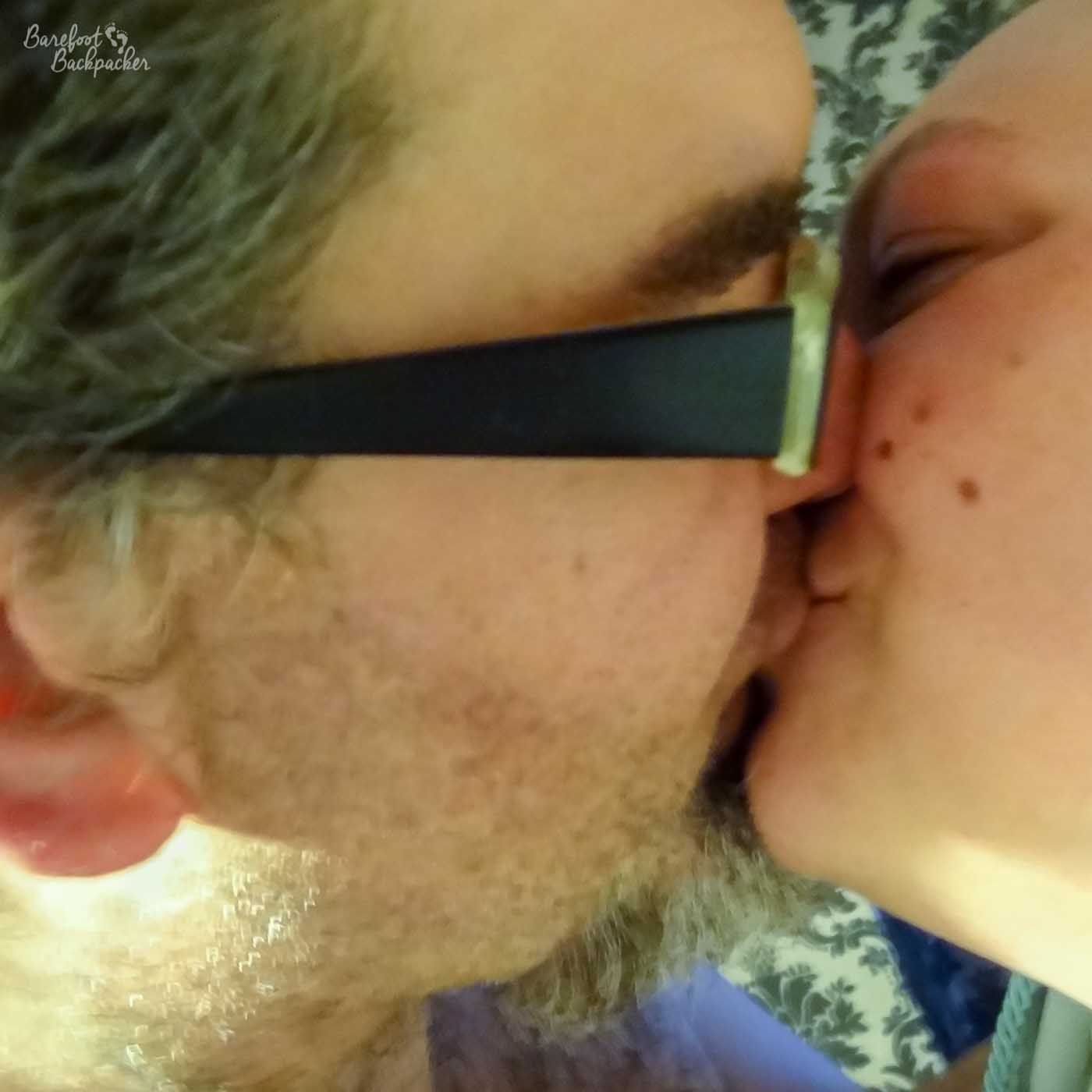
Sometimes I have been known to kiss people. Often I afterwards realise why I don’t do it very often.
For the vast majority of people, romantic attraction is a ‘given’. That is to say, your romantic attraction and your sexual attraction align so much that it’s not just hard to tell the difference, it’s that it makes no sense to make a difference in the first place. So let me give you an example of where there’s a disconnect.
One of the problems with the suffix ‘-sexuality’ is that it means one thing but is used in another. Someone who is homosexual, for instance, has an attraction to people of their own sex. And most people get that; it’s a concept that makes sense, even if you don’t agree with it. However, I’ve spent long enough on homosexual personals forums to know it’s not quite that simple.
See, these forums are populated by a large number of nominally heterosexual men. But surely, you might think, if they’re on a m4m dating site, they’re not homosexual – they’re at least bisexual, and at most very heavily closeted.
The problem with that logic comes when you see what it is they’re looking for. Spoiler: it’s sex. These sites have a large number of heterosexual men who want to have sex with other men. Not a relationship, not love, not even attraction. For the most part they don’t like men in that way, they’re not attracted to men, they just want to have sex with a man. This is where the words ‘homosexual’ and ‘bisexual’ become … ‘inaccurate’.
Someone who describes themselves as ‘homosexual’ is very likely to desire to both a) have sex with men, and b) enter into a long-term relationship with a man. If you only want one of these, regardless of which one it is, are you still ‘homosexual’? Similarly, can you say you’re truly ‘bisexual’ or ‘pansexual’ if you don’t want to do both with more than one gender? If you’re a man, and have sex with men and women, but only want a long-term relationship with a woman, how would you describe yourself? In dating terms, you’d be heterosexual. Now some people use the term ‘bi-curious’ for this, but if you’re going to gay saunas every week, I’m not sure how ‘curious’ about the whole thing you still are. I’ve also seen the term ‘heteroflexible’ bandied around, but again that still defines things lexically in terms of ‘sexual’ preference and activity, even if in practice it’s a more accurate and broad terminology. And yes, ‘homoflexible’ also exists.
You might say I’m splitting hairs over a minor issue that only affects a small demographic, but consider this: can you honestly say you have ‘loved’ (or, had a romantic attraction to) every single person you’ve had sex with? I’ve (surprisingly) been to nightclubs in my younger days, and of course I’ve stayed in backpacker hostels on my travels. I’ve heard what happens when people with a strong sexual attraction and absolutely no romantic attraction meet up. There are literally signs and rules in hostels about this (usually ‘if you think you’re going to do this, book a private room not a dorm bed’).
Of course there’s also the whole issue of people cheating in relationships (‘it was nothing serious dear, I don’t love her, it was just a silly fling’). And people who have sexual contact with their friends because at that specific point in time, they both feel they want to be more ’intimate’ than they previously had been, with the assumption it won’t affect their friendship (spoiler: it usually does, but asexuals find this easier than allosexuals). People differentiate between sexual and romantic attraction every day, they just don’t think of sex in those terms.
The difference with asexuality is that, not having the sexual attraction in the first place, it becomes necessary for us to split them out; if nothing else to prove that asexuality and love aren’t incompatible. This is where you might hear the phrase ‘split attraction model’. This is where we separate and identify different types of attraction; not just sexual from romantic, but also related ideas like aesthetic and platonic attraction.
What is ‘aesthetic attraction’?
Have you ever felt that someone ‘looks nice’? That’s pretty much what aesthetic attraction is. Now, you might wonder how this is different from sexual attraction, so think of this: suppose you have a painting on your wall, of, say, a landscape, a bowl of fruit, or even a person. You like that painting, it appeals to your senses. You like the way it’s painted, the style of painting, the intricate care taken with the brush strokes. It makes your wall, your room, brighter. But do you want to fuck the painting? Reader, you do not, because that would be weird.
Now imagine the same principle applied to real humans. For many people, the overlap between sexual and aesthetic attraction is just as obvious as that between sexual and romantic attraction; ‘they’re hot’ is a phrase that generally implies both. I’ll admit it’s rare that I experience aesthetic attraction – indeed one of the early pointers to my asexuality in general was finding it hard to answer the questions that friend groups and work colleagues often ask of each other: ‘so, tell me 5 people you find attractive’ (in such questions, ‘attractive’ means ‘bonkable’). I once told a work colleague that I found the music video to Beyoncé’s “Single Ladies” to be very boring as it was simply “three women dancing, nothing actually happens”. His response was “oh, but what women!” – an example of how a highly sexualised society also relates to toxic masculinity.
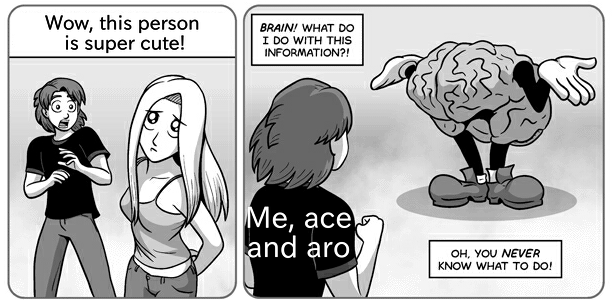
A panel strip from El Goonish Shive by Dan Shive.
I find people aesthetically attractive without finding them sexually attractive. And I can find them aesthetically attractive without then having a crush (or squish – think of it as a purely platonic crush) on them, although the two often align. I can also have deep platonic relationships with people I don’t find aesthetically attractive. Just because I don’t find someone aesthetically attractive doesn’t mean I think they’re ‘ugly’, by the way; the two are very different concepts. Rather, think of it more in proactive terms: if you like the look of a piece of art, that doesn’t make all other art ‘ugly’, it just doesn’t make it especially appealing to you, it’s ‘average’, ‘standard’. So with people; not finding someone aesthetically attractive simply means you won’t remember them, not that you find them unattractive.
Do asexuals have crushes on people?
A ‘crush’ is generally accepted to mean some kind of specific attraction to a person. You want to be around them, and you change your behaviour slightly to make sure they’re not put off by things you say. While this is normally a prelude to sexual and romantic attraction – ie you like them and/because you want to date/bonk them, it could just mean you’re fanboy/girl/enby-ing over them and want them to simply notice you.
Since asexuals tend to differentiate between different types of attraction, we also differentiate between different types of ‘crush’. I’ve already mentioned ‘squish’, the longing for ‘platonic’ interaction with someone, but there’s also ‘lush’ (for sexual attraction), ‘swish’ (for aesthetic attraction), and many others.
In general parlance, ‘crush’ signifies some kind of romantic attraction, so yes, asexuals very much can have crushes on people. They’re exactly what you’d expect – feelings inside when you think of someone that make you kind of ‘giddy’; that give you a sense of excitement when you see their name coming online, or having ‘liked’ one of your tweets, or something, and that imagining being physically next to makes you either get really excited or a little lost in longing. A little like teenage crushes on pop-stars and actors, but confused by the fact you really know this person.
The main problem with an asexual crush is that it’s very likely the person you have a crush on isn’t asexual. This means they may have very different needs and desires, or may not quite understand what asexuality is. This may make a ‘crush’ to be purely one-way and mean it be less likely something concrete would come of it, since neither of you can match what the other is looking for. Awks. It of course gets even more tricky if you define as aromantic.
How can asexuals find love?
Traditional dating sites and apps are mostly geared to the sexual cultures, not just in terms of admin (few dating sites have an ‘asexual’ option, never mind ‘aromantic’), but also in terms of the people who use them. There’s an expectation that if you’re signed up to one, you’re there to develop some kind of romantic relationship, and one that includes sex, because, well, isn’t that the whole point of dating? I’m not many people’s ‘target market’. There’s not a lot of point me going on apps like Tinder, Bumble, or Grindr, because I literally can’t offer what other people want. Unless the other person is also acespec, which (given you usually can’t sign up as ace, and have to put it in the profile, and of course no-one reads profiles) is pretty unlikely to be honest.
Of the standard personals sites, the only one I’ve ever actively used (and, incidentally, one of the only ones that acknowledges the existence of asexuality) is OKCupid, and even that I haven’t been on to since about 2012. Apparently it’s got much worse and more like standard dating sites than it used to be when I was active on there, which is a shame, but I did use it in the past as a means to find friends specifically, rather than lovers. I found lovers too, but the usual happened and they became good friends anyway.
Acespec-specific dating sites do exist, though I have to say I haven’t used any yet. Obviously any social site can be a dating site with enough determination (it’s three parts squick and one part ‘aww bless your naivety and overblown self-worth’ when people slide into your DMs on sites like Instagram with a ‘hey’. Even forum sites like Reddit can be used to flirt), but from my end, I’d argue the best way to find friends on the internet is to … use any sites in the manner and purpose for which they were intended. If you ‘click’ with someone through it, then fabulous. I have a couple of close friends I met because we connected through LiveJournal, and then developed our friendships over time elsewhere. Similarly, I’ve got some very special people in my life that I know through Twitter, with whom I very definitely have a ‘platonic relationship’.
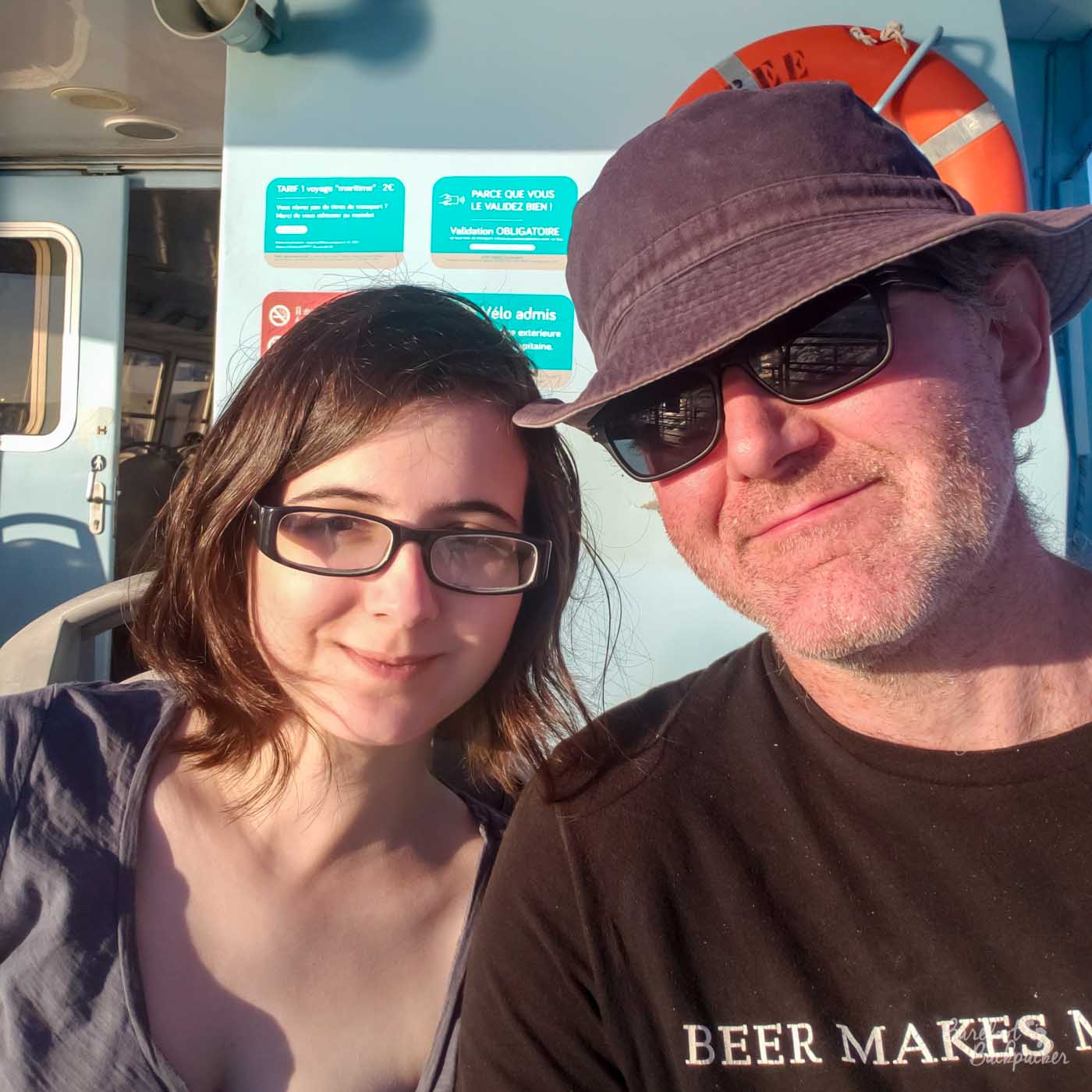
Me and my friend Lix, who I travelled with in Autumn 2019.
The advantage of not using a dating site and letting things develop organically is that there’s even less pressure and subtext, you don’t have the knowledge and feeling that you’re going into something ‘on purpose’, that you’re ‘directing’ or ‘forcing’ things just because of how you know each other. The disadvantage is that, by and large, it won’t happen very often – you may have 9,000 followers on Twitter, for instance, but how many of them do you have a deep personal connection with that makes you want to stay up all night talking about your deepest feelings, or hold hands with in the street if you met up with them? [In my case, hmmm … about ten maybe? I think they all know who they are, too, which of course helps].
How does being asexual affect my love life?
For me, one the issues affecting my love life is around the limits of what a relationship is.
I feel most people draw a line between friendship and love that for me simply doesn’t exist. Like, I like doing what some might define as intimate touching; despite not being overly fond of receiving them, I do like giving other people backrubs, footrubs, massages etc. Admittedly this might again be my submissive, people-pleasing attitude, but also there’s a large caveat that, looking from the outside, would confuse most people.
I do these things with my friends.
Friendship is more important to me than anything else, and I act around friends the way many people may act around lovers or partners. I hold hands with friends, I hug friends, I’ll give massages to friends, because it’s a nice and pleasant thing to do with and for them. I’ve even gone travelling with friends, shared restaurant evenings and even hotel rooms with them.
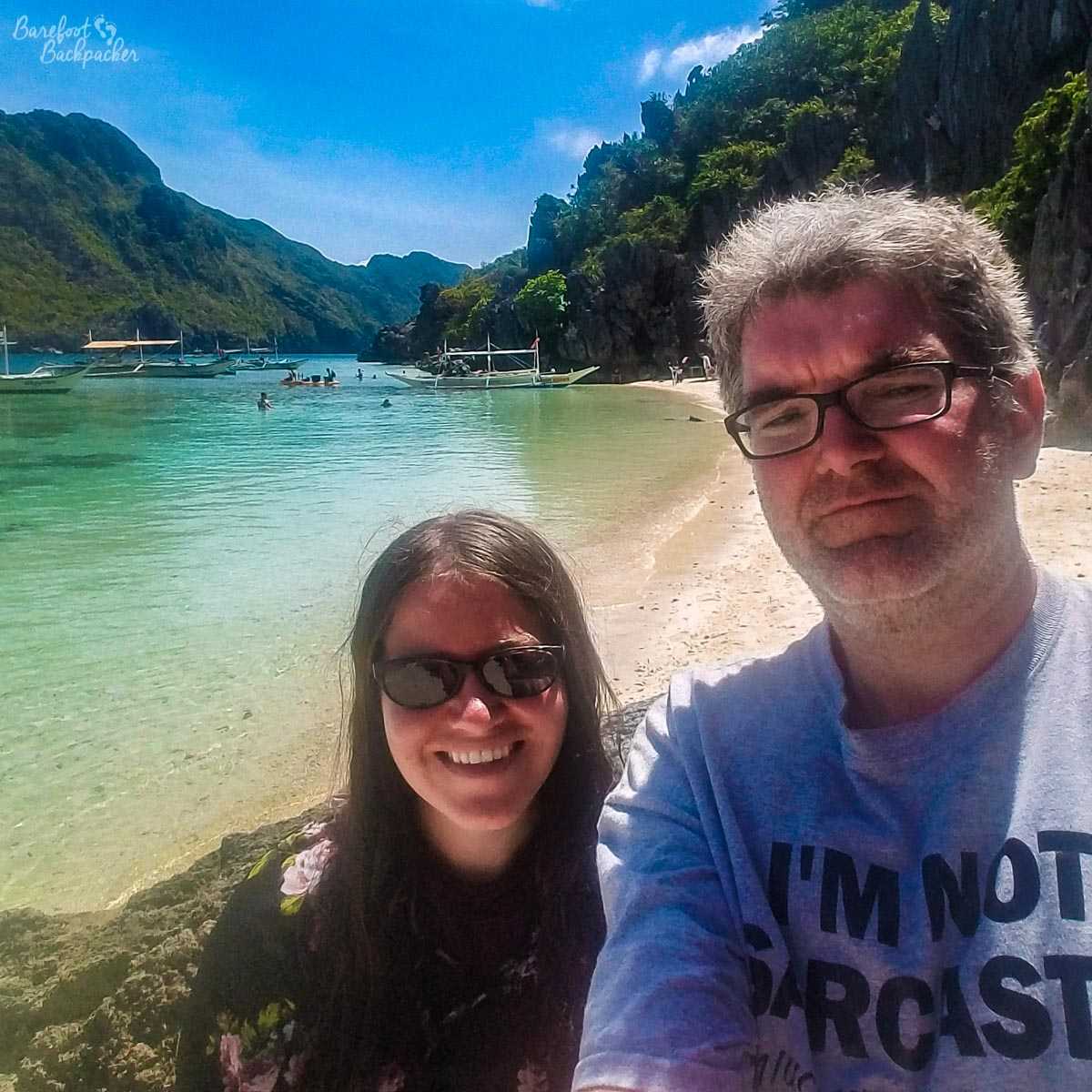
Me and my friend Laura, when we were travelling Philippines together.
What would my ideal asexual and aromantic relationship look like?
As an asexual and aromantic, my ideal relationship looks a lot like friendship. Deep, intimate, close, friendship.
We’d talk late into the evening sharing darkest secrets whilst cuddling on the sofa. We’d have candlelit dinners. We’d hold hands with walking down the street. Not gardening though, I have my limits. But equally, they’d also be someone who has their own separate life, their own friends, their own lovers. I’m fully aware that most people are inherently more sexual than I am, so I’d expect my friends to have their sexual needs met elsewhere. The relationship we’d have would be one born out of friendship rather than any kind of exclusive romantic attraction/commitment. We’d not worry about these friends being just as close as we were. Friendship is not an exclusive trait, What we’d do together, we’d do because we were close enough friends to do them, and there’d be no sexual subtext or feeling that either of us were expecting anything more out of the relationship.
In a sense, I don’t really differentiate between friends and lovers, because I’m not usually sexually intimate so from the outside I just look like I have close friends. The problem is, I may ‘squish’ on people who aren’t right for me in a long-term ‘intimate’ sense, for whom I’m “not enough”. It’s not that I’m not *good* enough, not at all, it’s that what I offer isn’t *enough* for what they personally need. So we’re still good close friends, but I’m wary about being as close as I’d like to be, just in case they take it the wrong way and pull away. Like, as I say I like holding hands with friends, but of course many people reserve that kind of affection for someone they’re dating, so I never get to do it, I’d rather have a friend I can’t hold hands with but would want to, than someone who used to be a friend but I scared off with my weird level of friendship-intimacy.
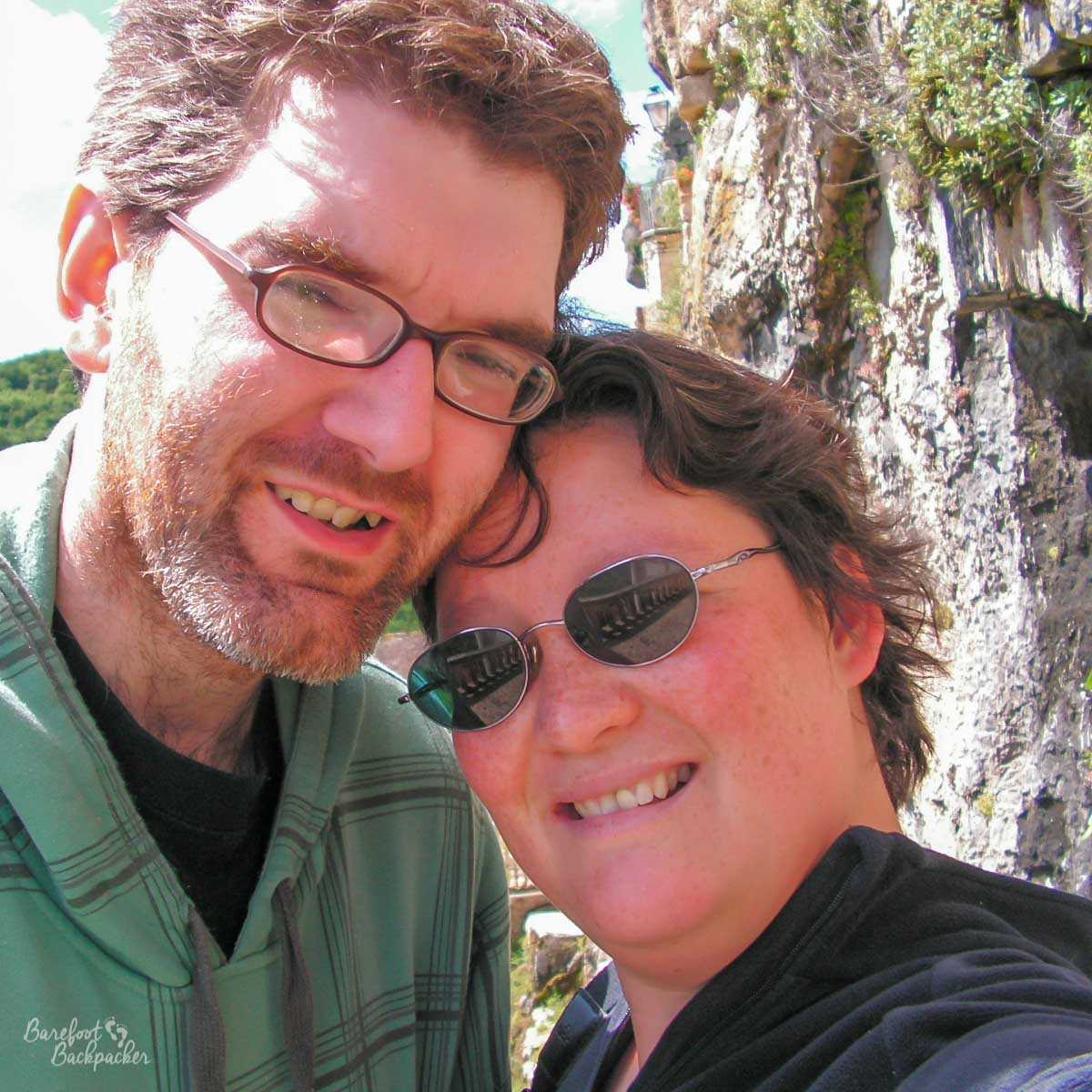
Me and my friend Anne-Laure. At the time this image was taken, a long time ago, we were dating.
It’s hard to describe what I want, but there’s a phrase for it, and I talk about ‘Queer Platonic Relationships’ elsewhere. The issue comes when you realise that not everyone wants that as their ‘relationship goal’; for some people, ‘I love you’ means something specific and particular, something I just can’t relate to. In addition, the sort of people who would be happy with this kind of relationship are exactly the sort of people who aren’t looking for one because, like me, they’re comfortable being on their own without having that “special one”.
What is demisexuality?
Demisexuals are people on the asexuality spectrum who do experience sexual attraction, but generally only after a strong emotional bond has been formed, usually after what you might define as ‘love’ or at least a strong and long-lasting feeling and experience of romantic attraction. A full explanation is beyond the scope of this blog post (because I’m not demisexual) but you can find more information here, and a podcast (transcript) with an interview with a demisexual here.
Conclusion
Asexuality and love are not as contrary as it may appear. Love and sex are not the same, and just because you don’t experience sexual attraction, that doesn’t mean you can’t ‘fall in love’. The problem for asexuality is love doesn’t always mean the same thing to different people, and this may make it harder for asexuals to find suitable ‘love’ partners.